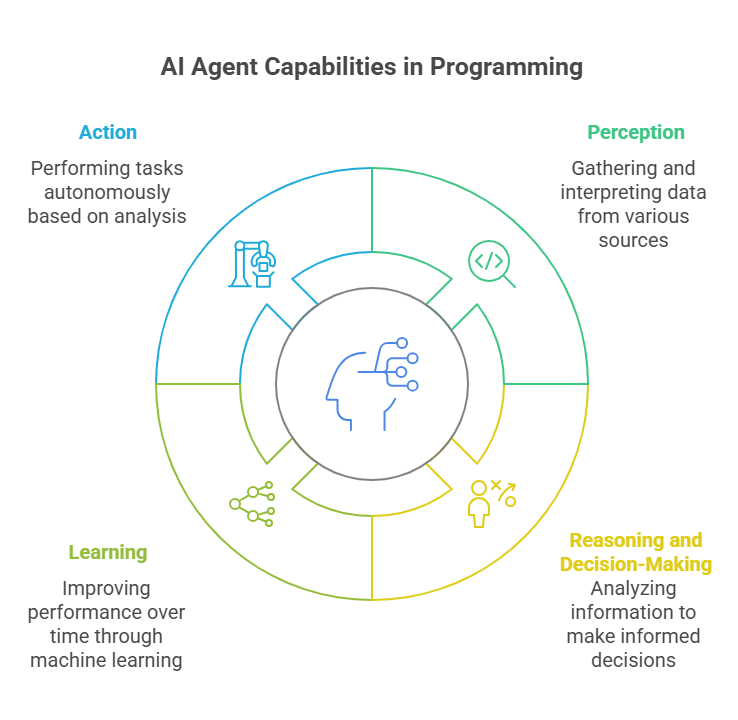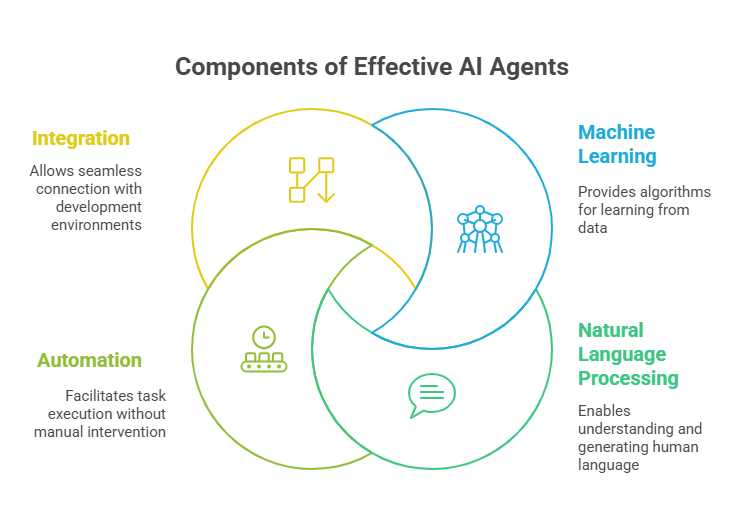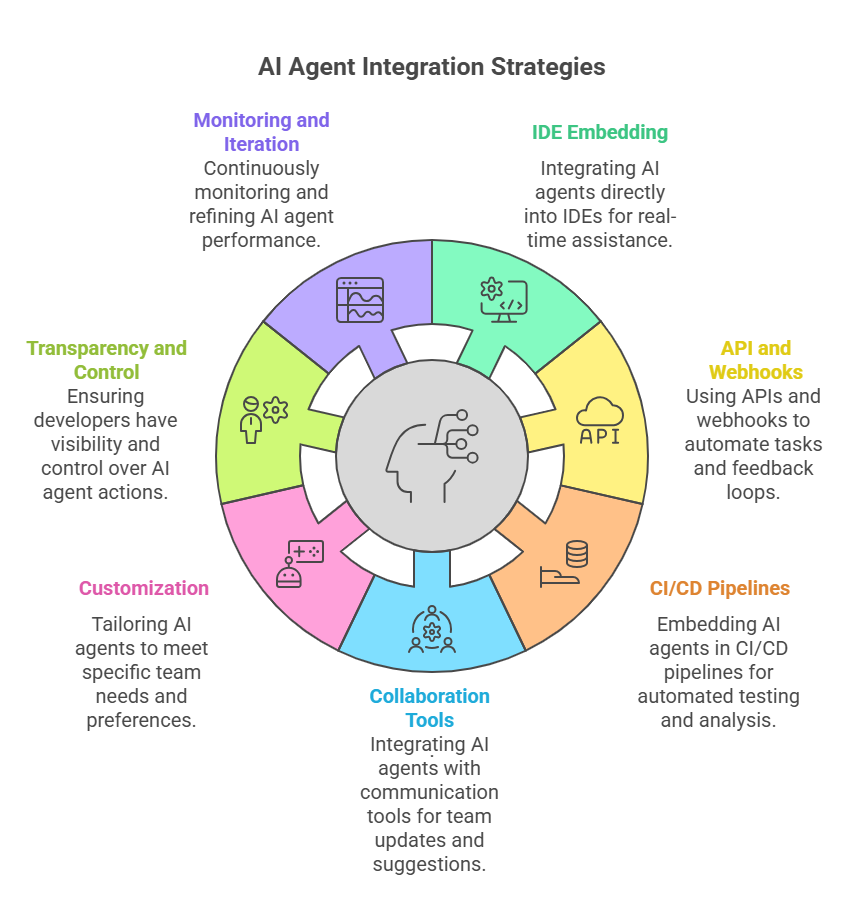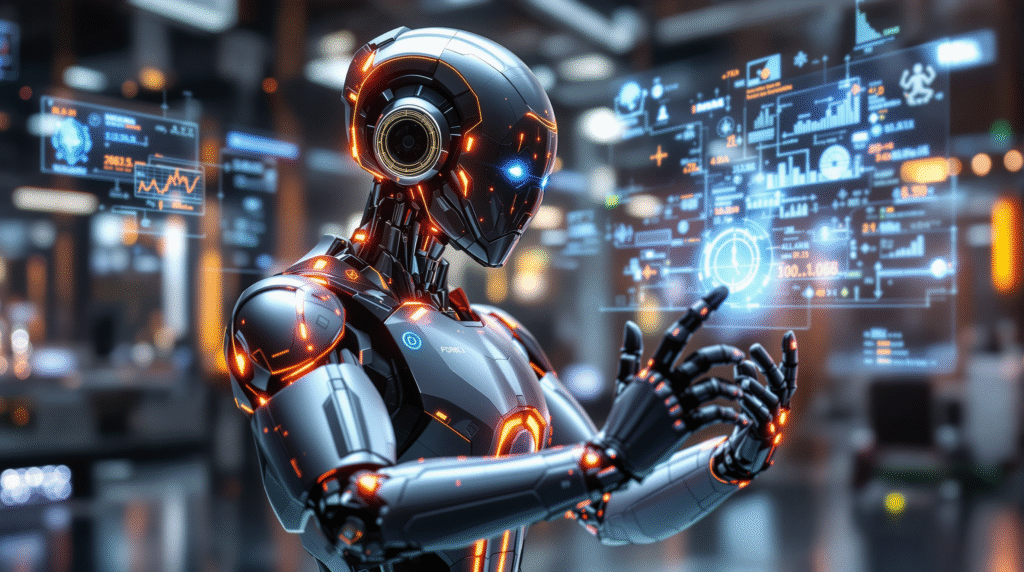Introduction: The Rise of AI Agents in Programming
The landscape of software development is rapidly evolving, and one of the most transformative forces driving this change is the emergence of AI agents. These intelligent systems are designed to assist programmers by automating repetitive tasks, enhancing productivity, and enabling more creative problem-solving. The rise of AI agents marks a significant shift from traditional manual coding towards a more collaborative human-AI development process.
AI agents in programming are software entities capable of understanding, learning, and performing tasks autonomously or semi-autonomously. They leverage advances in machine learning, natural language processing, and data analysis to support developers in various stages of the software lifecycle—from writing and debugging code to testing and deployment.
The growing adoption of AI agents is fueled by the increasing complexity of software projects and the demand for faster delivery cycles. By automating routine and time-consuming tasks, AI agents free developers to focus on higher-level design and innovation. Moreover, these agents can continuously learn from codebases and developer interactions, improving their assistance over time.
In this article series, we will explore how AI agents are practically applied to automate daily programming tasks, the tools and frameworks available, integration strategies, and the challenges developers may face. Understanding the rise of AI agents is the first step toward embracing this powerful technology and transforming the way software is built.
Understanding AI Agents: Definitions and Capabilities
AI agents are autonomous or semi-autonomous software entities designed to perform specific tasks by perceiving their environment, processing information, and taking actions to achieve defined goals. In the context of programming, AI agents assist developers by automating routine activities, providing intelligent suggestions, and enhancing overall workflow efficiency.
At their core, AI agents combine several key capabilities:
Perception: The ability to gather and interpret data from various sources, such as code repositories, development environments, and user inputs. This enables agents to understand the current state of a project or task.
Reasoning and Decision-Making: Using algorithms and models, AI agents analyze information to make informed decisions. For example, an agent might identify code patterns that suggest bugs or recommend optimizations.
Learning: Many AI agents employ machine learning techniques to improve their performance over time. By learning from past interactions and data, they adapt to the developer’s style and project requirements.
Action: Based on their analysis, agents can perform actions autonomously, such as generating code snippets, refactoring code, running tests, or managing version control operations.
Types of AI agents commonly used in programming include:
Assistants: Tools like code completion engines and chatbots that help with writing and understanding code.
Automators: Agents that handle repetitive tasks such as formatting, testing, and deployment.
Analyzers: Systems that perform static code analysis, detect vulnerabilities, or suggest improvements.

Common Programming Tasks Suitable for Automation
AI agents have proven highly effective in automating a variety of programming tasks that are repetitive, time-consuming, or prone to human error. By delegating these tasks to intelligent agents, developers can focus more on creative problem-solving and complex design. Here are some common programming activities where AI agents can add significant value through automation:
- Code Generation and Completion
AI-powered code completion tools can predict and suggest code snippets as developers type, speeding up the coding process and reducing syntax errors. More advanced agents can generate entire functions or modules based on high-level descriptions or comments.
- Code Refactoring
Refactoring involves restructuring existing code to improve readability, maintainability, or performance without changing its behavior. AI agents can analyze codebases to identify refactoring opportunities and even apply changes automatically, ensuring consistent code quality.
- Debugging and Error Detection
Detecting bugs and errors early is critical for software quality. AI agents can scan code for common mistakes, potential vulnerabilities, or logic errors. Some agents can also suggest fixes or automatically generate test cases to verify code correctness.
- Testing Automation
Writing and maintaining tests is often tedious. AI agents can generate unit tests, integration tests, and even simulate user interactions to ensure comprehensive coverage. They can also monitor test results and highlight flaky or failing tests for developer attention.
- Code Review Assistance
AI agents can assist in the code review process by automatically checking for style violations, security issues, or performance bottlenecks. They can provide actionable feedback, helping reviewers focus on higher-level design considerations.
- Documentation Generation
Keeping documentation up to date is challenging. AI agents can generate or update documentation based on code changes, comments, and usage patterns, improving knowledge sharing within teams.
- Version Control Management
Tasks like merging branches, resolving conflicts, and managing pull requests can be streamlined with AI agents that understand project history and developer intent, reducing integration issues.
Tools and Frameworks for Building AI Agents
Building effective AI agents for programming tasks requires leveraging the right tools and frameworks that provide capabilities for machine learning, natural language processing, automation, and integration with development environments. Below are some popular and powerful options that developers can use to create AI agents:

- Machine Learning Libraries
TensorFlow and PyTorch: Widely used frameworks for building and training machine learning models, including deep learning architectures that power intelligent agents.
scikit-learn: A versatile library for classical machine learning algorithms, useful for tasks like classification, regression, and clustering.
- Natural Language Processing (NLP) Tools
spaCy and NLTK: Libraries for processing and understanding human language, essential for agents that interpret code comments, documentation, or developer queries.
Transformers (Hugging Face): Provides pre-trained models like GPT and BERT, enabling agents to generate code, answer questions, or summarize information.
- Automation and Workflow Tools
Apache Airflow and Prefect: Platforms for orchestrating complex workflows, useful for managing multi-step automation tasks performed by AI agents.
RPA Tools (e.g., UiPath, Automation Anywhere): Though more common in business process automation, these can be adapted for automating repetitive programming-related tasks.
- Development Environment Integration
Visual Studio Code Extensions: Many AI agents are integrated as extensions, providing code completion, linting, and debugging assistance directly in the IDE.
Jupyter Notebooks: Popular for prototyping AI agents and experimenting with code generation or data analysis.
- Agent Frameworks and Platforms
OpenAI API: Provides access to powerful language models that can be used to build conversational agents, code generators, and assistants.
Rasa: An open-source framework for building conversational AI agents, which can be adapted for programming assistant roles.
Mesa: A Python framework for building agent-based models, useful for simulating multi-agent interactions.
- Containerization and Deployment
Docker and Kubernetes: Essential for packaging AI agents and deploying them in scalable, distributed environments, ensuring reliability and ease of updates.
Integrating AI Agents into Modern Development Workflows
Integrating AI agents into modern software development workflows is a crucial step toward harnessing their full potential. Proper integration ensures that AI agents complement developers’ efforts, streamline processes, and enhance productivity without causing disruption or friction. This article explores best practices and strategies for embedding AI agents effectively within existing development environments and workflows.
Understanding the Development Workflow
Modern software development typically involves multiple stages, including planning, coding, testing, deployment, and maintenance. Teams often use tools such as version control systems (e.g., Git), continuous integration/continuous deployment (CI/CD) pipelines, issue trackers, and collaboration platforms. AI agents must be designed to interact smoothly with these tools and fit naturally into the developers’ daily routines.
Key Integration Strategies
Embed AI Agents in Development Environments
One of the most effective ways to integrate AI agents is by embedding them directly into Integrated Development Environments (IDEs) like Visual Studio Code, JetBrains IntelliJ, or Eclipse. This allows agents to provide real-time assistance such as code completion, error detection, and suggestions without interrupting the developer’s workflow. IDE plugins or extensions are common delivery methods.
Leverage APIs and Webhooks
AI agents can be integrated into development pipelines through APIs and webhooks. For example, agents can automatically analyze pull requests, run code quality checks, or trigger tests when new code is pushed to a repository. This automation reduces manual overhead and accelerates feedback loops.
Incorporate AI Agents into CI/CD Pipelines
Continuous integration and deployment pipelines are ideal places to embed AI agents that perform automated testing, security scanning, and performance analysis. By integrating agents into these pipelines, teams can catch issues early and maintain high code quality throughout the development lifecycle.
Facilitate Collaboration and Communication
AI agents can be integrated with team communication tools such as Slack, Microsoft Teams, or Jira. For instance, agents can notify developers about build failures, suggest fixes, or summarize code review comments. This keeps the team informed and engaged without overwhelming them with information.
Customize Agents to Team Needs
Successful integration requires tailoring AI agents to the specific needs and preferences of the development team. This includes configuring the agent’s behavior, setting thresholds for alerts, and defining the scope of automation. Customization ensures that agents provide relevant and actionable assistance.
Ensure Transparency and Control
Developers should have clear visibility into the actions and recommendations of AI agents. Providing explanations for suggestions and allowing developers to accept, reject, or modify agent outputs fosters trust and encourages adoption.
Monitor and Iterate
Integration is an ongoing process. Teams should monitor how AI agents impact productivity and code quality, gather feedback, and continuously refine agent behavior and integration points. This iterative approach helps maximize benefits and address any challenges promptly.
Benefits of Effective Integration
When AI agents are well integrated, they can significantly reduce repetitive tasks, accelerate development cycles, and improve code quality. Developers gain a reliable partner that enhances their capabilities, enabling them to focus on complex problem-solving and innovation.

Automating Code Generation and Refactoring
AI agents have become powerful tools for automating code generation and refactoring, significantly enhancing developer productivity and code quality. By leveraging machine learning models and intelligent algorithms, these agents can write new code, suggest improvements, and restructure existing codebases with minimal human intervention.
Automating Code Generation
AI-driven code generation involves creating new code snippets, functions, or even entire modules based on high-level descriptions, comments, or examples provided by developers. Modern language models, such as those based on transformer architectures, can understand natural language prompts and generate syntactically correct and contextually relevant code.
Benefits of automated code generation include faster prototyping, reduced boilerplate coding, and assistance in unfamiliar programming languages or frameworks. However, generated code should always be reviewed and tested to ensure correctness and security.
Automating Code Refactoring
Refactoring improves code readability, maintainability, and performance without changing its external behavior. AI agents can analyze code to detect smells, redundant patterns, or inefficient constructs and suggest or apply refactoring transformations automatically.
Common refactoring tasks automated by AI agents include renaming variables for clarity, extracting methods to reduce duplication, simplifying complex expressions, and reorganizing code structure.
Python Code Example: Simple Automated Refactoring
Below is a minimal Python example demonstrating how an AI agent might automate a simple refactoring task—renaming variables in a code snippet using the rope library, a Python refactoring tool.
python
import rope.base.project
from rope.refactor.rename import Rename
# Initialize a rope project in the current directory
project = rope.base.project.Project('.')
# Sample code to refactor
code = '''
def calculate_area(radius):
r = radius
area = 3.14 * r * r
return area
'''
# Create a resource in the project
resource = project.new_file('example.py', code)
# Rename variable 'r' to 'radius_value'
renamer = Rename(project, resource, offset=code.index('r = radius'))
changes = renamer.get_changes('radius_value')
# Apply the changes
project.do(changes)
# Read the refactored code
refactored_code = resource.read()
print(refactored_code)
# Close the project
project.close()This script initializes a project, creates a file with sample code, and renames the variable r to radius_value. Such automated refactoring can be extended to more complex transformations with AI assistance.
Best Practices
Always review AI-generated or refactored code to ensure it meets project standards and does not introduce bugs.
Combine AI automation with human expertise for optimal results.
Integrate code generation and refactoring agents into development environments for seamless workflows.
AI Agents in Debugging and Testing Processes
AI agents are increasingly transforming debugging and testing in software development by automating error detection, diagnosis, and test generation. Their ability to analyze large codebases, learn from past bugs, and simulate diverse scenarios helps developers identify issues faster and improve software quality.
AI-Powered Debugging
Traditional debugging can be time-consuming and error-prone. AI agents assist by automatically detecting anomalies, predicting potential bugs, and suggesting fixes. They analyze code patterns, runtime logs, and historical bug data to pinpoint problematic areas. Some agents can even generate explanations for errors, helping developers understand root causes more quickly.
For example, AI agents integrated into IDEs can highlight suspicious code lines in real time or recommend patches based on similar past issues. This proactive approach reduces the time spent on manual debugging.
Automated Test Generation
Testing is essential for verifying software correctness but often requires significant manual effort. AI agents can generate unit tests, integration tests, and even end-to-end tests by learning from existing code and specifications. They can create test cases that cover edge conditions and rare scenarios that might be overlooked by human testers.
By automating test creation, AI agents help maintain high test coverage and accelerate regression testing, ensuring that new changes do not introduce bugs.
Continuous Testing and Monitoring
AI agents can continuously monitor software behavior in production environments, detecting anomalies and performance degradations early. They can trigger automated tests or alerts when unusual patterns emerge, enabling rapid response to issues.
Python Code Example: Simple Automated Test Generation
Here is a basic example using the hypothesis library to generate property-based tests automatically for a function:
python
from hypothesis import given
import hypothesis.strategies as st
def reverse_string(s: str) -> str:
return s[::-1]
@given(st.text())
def test_reverse_string(s):
# Reversing twice should return the original string
assert reverse_string(reverse_string(s)) == s
# Run the test
test_reverse_string()
print("Test passed!")This test automatically generates diverse string inputs to verify that reversing a string twice returns the original string, illustrating how AI-inspired tools can automate test case generation.
Benefits of AI in Debugging and Testing
Faster identification and resolution of bugs
Increased test coverage and quality
Reduced manual effort and human error
Continuous monitoring and proactive issue detection
Challenges
Ensuring AI-generated tests are meaningful and maintainable
Integrating AI tools smoothly into existing workflows
Handling false positives or irrelevant suggestions
Managing Version Control and Code Reviews with AI Agents
AI agents are revolutionizing how developers manage version control and conduct code reviews by automating routine tasks, improving code quality, and accelerating collaboration. Integrating AI into these processes helps teams maintain cleaner codebases and streamline development cycles.
AI in Version Control Management
Version control systems (VCS) like Git are essential for tracking changes, managing branches, and coordinating team efforts. AI agents can assist by automatically analyzing commit histories, detecting anomalies, and suggesting optimal branching or merging strategies. They can also predict potential conflicts before they occur, reducing integration issues.
For example, AI agents can flag risky commits that might introduce bugs or security vulnerabilities, prompting developers to review changes more carefully. Additionally, agents can automate changelog generation by summarizing commit messages and highlighting key updates.
AI-Assisted Code Reviews
Code reviews are critical for maintaining code quality but can be time-consuming. AI agents help by automatically analyzing pull requests to detect style violations, potential bugs, security flaws, and performance issues. They provide inline comments with suggestions, enabling faster and more thorough reviews.
Some AI tools can learn team-specific coding standards and adapt their feedback accordingly, making reviews more consistent and aligned with project guidelines. This reduces the cognitive load on human reviewers and accelerates the approval process.
Automating Routine Tasks
AI agents can automate repetitive tasks such as labeling pull requests, assigning reviewers based on expertise, and verifying that tests pass before merging. This automation frees developers to focus on complex problem-solving and design decisions.
Python Code Example: Simple Git Commit Message Linter
Below is a minimal example of a Python script that an AI agent might use to enforce commit message conventions automatically:
python
import re
import sys
def lint_commit_message(message: str) -> bool:
# Example rule: Commit message must start with a capital letter and be under 50 characters
if not message:
return False
if not re.match(r'^[A-Z]', message):
return False
if len(message) > 50:
return False
return True
if __name__ == "__main__":
commit_msg = sys.argv[1] if len(sys.argv) > 1 else ""
if lint_commit_message(commit_msg):
print("Commit message is valid.")
sys.exit(0)
else:
print("Invalid commit message. It must start with a capital letter and be under 50 characters.")
sys.exit(1)This script can be integrated as a Git hook to automatically check commit messages, ensuring consistency and quality.
Benefits
Improved code quality and consistency
Faster review cycles and reduced bottlenecks
Early detection of potential issues in commits
Enhanced collaboration through automated assistance
Challenges
Balancing automation with human judgment
Avoiding overwhelming developers with excessive suggestions
Ensuring AI tools adapt to evolving team standards
Enhancing Collaboration and Communication Using AI Agents
AI agents are transforming collaboration and communication within software development teams by facilitating smoother workflows, reducing misunderstandings, and automating coordination tasks. Their integration into development environments helps teams work more efficiently and cohesively.
Facilitating Real-Time Communication
AI agents can act as intelligent intermediaries in chat platforms and project management tools, summarizing discussions, highlighting action items, and answering technical questions. By providing instant access to documentation, code snippets, or previous decisions, they reduce the need for lengthy explanations and help keep everyone on the same page.
Automating Task Management
AI agents can monitor project progress, update task statuses, and remind team members of deadlines or pending reviews. They can also suggest task assignments based on individual expertise and workload, optimizing resource allocation and preventing bottlenecks.
Supporting Knowledge Sharing
By analyzing codebases, documentation, and communication logs, AI agents can identify knowledge gaps and recommend relevant resources or experts within the team. This promotes continuous learning and helps new team members onboard faster.
Enhancing Code Collaboration
AI agents integrated with version control systems can detect conflicting changes early and suggest resolutions. They can also facilitate pair programming by providing real-time code suggestions and explanations, improving code quality and team synergy.
Python Code Example: Simple Slack Bot for Summarizing Messages
Here is a basic example of an AI-powered Slack bot that summarizes recent messages in a channel using a placeholder summarization function:
python
import os
from slack_sdk import WebClient
from slack_sdk.errors import SlackApiError
# Placeholder summarization function
def summarize_messages(messages):
# In practice, integrate with an AI summarization model
return "Summary: " + " ".join(msg['text'] for msg in messages[:5])
client = WebClient(token=os.environ['SLACK_BOT_TOKEN'])
channel_id = "C1234567890"
try:
response = client.conversations_history(channel=channel_id, limit=10)
messages = response['messages']
summary = summarize_messages(messages)
client.chat_postMessage(channel=channel_id, text=summary)
print("Summary posted successfully.")
except SlackApiError as e:
print(f"Error fetching or posting messages: {e.response['error']}")Challenges and Limitations of AI Automation in Programming
While AI agents bring significant benefits to software development, their adoption also presents several challenges and limitations that developers and organizations must carefully consider.
- Quality and Reliability of AI Outputs
AI-generated code or suggestions may contain errors, inefficiencies, or security vulnerabilities. Since AI models learn from existing data, they can inadvertently reproduce bad coding practices or biases. Ensuring the correctness and safety of AI-generated artifacts requires thorough human review and testing.
- Integration Complexity
Incorporating AI agents into existing development workflows and toolchains can be complex. Compatibility issues, varying team practices, and the need for customization may slow down adoption. Seamless integration demands careful planning and ongoing maintenance.
- Data Privacy and Security Concerns
AI agents often require access to codebases, logs, and other sensitive information. Protecting this data from unauthorized access or leaks is critical, especially in regulated industries. Additionally, using cloud-based AI services raises concerns about data sovereignty and compliance.
- Overreliance and Skill Degradation
Excessive dependence on AI automation might lead to skill erosion among developers, reducing their ability to solve problems independently. Balancing AI assistance with human expertise is essential to maintain a skilled workforce.
- Handling Ambiguity and Context
AI agents may struggle with understanding nuanced requirements, ambiguous instructions, or complex domain-specific knowledge. Misinterpretations can lead to inappropriate code generation or suggestions, requiring human oversight.
- Ethical and Legal Issues
The use of AI in programming raises ethical questions about accountability, intellectual property, and transparency. Determining responsibility for AI-generated code and ensuring compliance with licensing and copyright laws are ongoing challenges.
- Performance and Scalability
Running AI agents, especially those based on large models, can demand significant computational resources. Ensuring that AI tools perform efficiently and scale with project size is necessary to avoid bottlenecks.
Future Trends: The Evolving Role of AI Agents in Software Development
The role of AI agents in software development is rapidly evolving, driven by advances in artificial intelligence, machine learning, and automation technologies. As these agents become more sophisticated, their impact on how software is designed, developed, and maintained will continue to grow, shaping the future of the industry.
- From Assistance to Autonomy
AI agents are transitioning from simple code completion and suggestion tools to autonomous entities capable of managing complex development tasks. This includes automated code generation, intelligent debugging, and even orchestrating entire development workflows with minimal human intervention.
- Integration Across the Development Lifecycle
Future AI agents will be deeply integrated into every phase of the software development lifecycle (SDLC), from requirements gathering and design to testing, deployment, and monitoring. This holistic integration will enable continuous feedback and optimization, improving software quality and delivery speed.
- Enhanced Collaboration Between Humans and AI
The evolving role of AI agents emphasizes collaboration rather than replacement. Agents will act as creative partners, augmenting human developers’ capabilities by handling routine tasks and providing insights, while humans focus on strategic and creative aspects.
- Context-Aware and Personalized Assistance
AI agents will become more context-aware, understanding project-specific conventions, coding styles, and team preferences. This personalization will make their assistance more relevant and effective, reducing friction and increasing adoption.
- Multi-Agent Systems and Orchestration
The future will see the rise of multi-agent systems where specialized AI agents collaborate and coordinate to solve complex problems. These systems will manage dependencies, optimize resource allocation, and adapt dynamically to changing project needs.
- Ethical and Responsible AI Development
As AI agents take on more responsibility, ensuring ethical behavior, transparency, and fairness becomes critical. Future trends include developing frameworks for explainability, bias mitigation, and compliance with regulatory standards.
- Leveraging Cloud and Edge Computing
AI agents will increasingly leverage cloud and edge computing resources to balance computational demands, reduce latency, and enhance scalability. This distributed approach will support real-time decision-making and continuous integration.
- Continuous Learning and Adaptation
AI agents will incorporate continuous learning mechanisms, adapting to new data, evolving codebases, and changing user requirements. This will enable them to stay effective over time and provide up-to-date support.
- Democratization of AI Agent Technologies
Advancements in low-code/no-code platforms and accessible AI frameworks will democratize the creation and deployment of AI agents, enabling more developers and organizations to benefit from intelligent automation.
- Future Skillsets for Developers
The evolving role of AI agents will reshape developer skillsets, emphasizing collaboration with AI, prompt engineering, and understanding of AI-driven workflows alongside traditional programming skills.
Human and AI: Agents as Creative Partners
AI Agents: Building intelligent applications with ease
Quantum Programming with AI Agents: New Horizons in Computing


